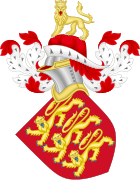Statute of Northampton
| Act of Parliament | |
 | |
| Citation | 2 Edw. 3 |
|---|---|
The Statute of Northampton (2 Edw. 3) is legislation passed by the Parliament of England which met in Northampton in 1328. The parliament also ratified the Treaty of Edinburgh–Northampton which ended the First War of Scottish Independence.
List of chapters
[edit]- (Confirmation of charters) c. 1
- (Pardons for felony, justices of assize, etc.) c. 2
- (Riding or going armed) c. 3
- (Sheriff) c. 4
- (Sheriff) c. 5
- (Confirmation of statutes, etc.) c. 6
- (Inquiry of past felons, etc.) c. 7
- (Commands in delay of justice) c. 8 — repealed by the Statute Law (Repeals) Act 1969, section 1 and Schedule, Part I
- (The staples) c. 9
- (Pardon of fines) c. 10
- (Common Bench) c. 11
- (Annexing hundreds to counties) c. 12
- (Process for past trespasses) c. 13
- (Measure, etc. of cloths imported) c. 14
- (Keeping of fairs) c. 15
- (Inquests) c. 16
- (Writs of deceit) c. 17
Riding armed
[edit]Chapter 3 would later be argued in legal disputes in the United States of America about Second Amendment rights. It said
Item, it is enacted, that no man great nor small, of what condition soever he be, except the King's servants in his presence, and his ministers in executing of the King's precepts, or of their office, and such as be in their company assisting them, and also [upon a cry made for arms to keep the peace, and the same in such places where such acts happen,] be so hardy to come before the King's justices, or other of the King's ministers doing their office, with force and arms, nor bring no force in affray of the peace, nor to go nor ride armed by night nor by day, in fairs, markets, nor in the presence of the justices or other ministers, nor in no part elsewhere, upon pain to forfeit their armour to the King, and their bodies to prison at the King's pleasure.[1]
The modern relevance of the legislation has been disputed: firearms did not exist at the time, and it is not immediately clear whether "nor to go nor to ride armed" (originally ne de chivaucher ne de daler arme in Anglo-Norman French) referred to carrying weapons or to wearing armour; it is also not clear whether it should be read primarily as permitting riding armed in the context of an official militia or posse, or as a prohibition in other situations.[2]
Qui tam
[edit]Chapter 15 regulated fairs and in particular required a lord to follow a royal charter or established usage to keep a fair open "for the Time that they ought to hold it, and no longer," with pre-publication of the closing time, subject to a fine for the lord and grievous punishment for the merchants if the fair stayed open longer.
| Sale of Wares after Close of Fair Act 1331 | |
|---|---|
| Act of Parliament | |
 | |
| Long title | The Penalty if any do sell Ware at a Fair after it is ended. |
| Citation | 5 Edw. 3. c. 5 |
| Other legislation | |
| Repealed by | Statute Law Revision Act 1958 |
Status: Repealed | |
| Text of statute as originally enacted | |
Enforcement against sales after the closing time of the fair was strengthened three years later with qui tam provisions in the Sale of Wares after Close of Fair Act 1331 (5 Edw. 3. c. 5), allowing private citizens to prosecute cases and receive a quarter of the fines based on double the value of improperly sold goods. This provision was not repealed until the Common Informers Act 1951.[3]
See also
[edit]References
[edit]- ^ "Supreme Court : NEW YORK STATE RIFLE & PISTOL ASSOCIATION, et al, Petitioners, v. KEVIN P. BRUEN, et al., Respondents" (PDF). Supremecourt.gov. Retrieved 7 November 2021.
- ^ SAUL CORNELL. "THE RIGHT TO KEEP AND CARRY ARMS IN ANGLO-AMERICAN LAW: PRESERVING LIBERTY AND KEEPING THE PEACE" (PDF). Core.ac.uk. Retrieved 7 November 2021.
- ^ Beck, J. Randy. "The False Claims Act and the English Eradication of Qui Tam Legislation" (PDF). Core.ac.uk. Retrieved 7 November 2021.
External links
[edit]- Tomlins, Thomas Edlyne; Raithby, John (1810). Statute of Northampton 1328 [Anno 2° Edwardi III. A.D. 1328.]. The Statutes of the Realm: Printed by Command of His Majesty King George the Third; in pursuance of an Address of the House of Commons of Great Britain. Vol. I. London, Great Britain: Dawson of Pall Mall. pp. 257–261. OCLC 426777557 – via HaithTrust.
